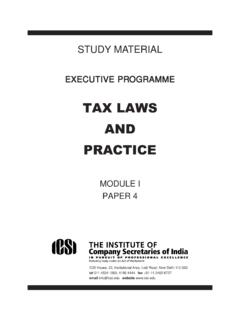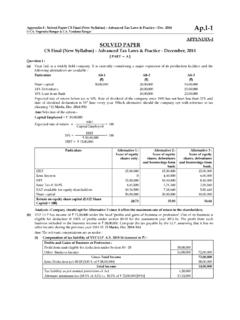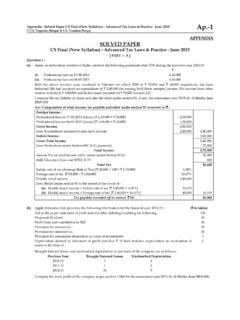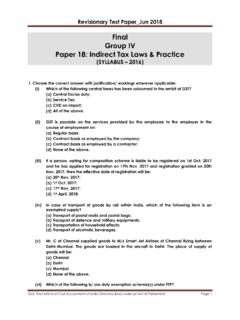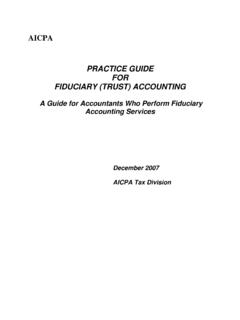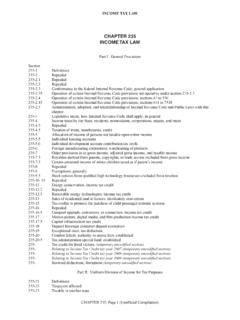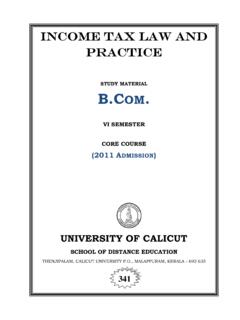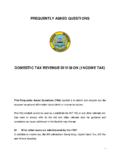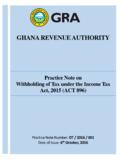Transcription of B.Com. V Sem (Tax) Subject- Income Tax Law And …
1 V Sem (Tax) subject - Income Tax Law And Practice 45, Anurag Nagar, Behind Press Complex, Indore ( ) Ph.: 4262100, 1 SYLLABUS V SEM (Tax) subject Income Tax Law And Practice UNIT-I General introduction of Indian Income tax act, 1961. Basic concepts: Income , agriculture Income , casual Income previous year, assessment year, gross total Income , total Income , person assessee, residential status and tax liability, exempted Income . Unit-II Income from salary, Income from house property. Unit-III Income from business and profession, capital gains, Income from other sources. Unit-IV Set off and carry forward of losses, deductions from gross total Income , clubbing of Income , computation of total Income and tax liability of an individual.
2 Unit-V Assessment procedure, tax deducted at source. Advance payment of tax. Income tax authorities. Appeal, revision and penalties. V Sem (Tax) subject - Income Tax Law And Practice 45, Anurag Nagar, Behind Press Complex, Indore ( ) Ph.: 4262100, 2 Unit 1 Basic concepts of Income Tax Meaning of Income Tax Income tax is a tax on year taxable Income of a person levied by the Central Government at prescribed rates. Tax payers include individual, firm, company, Hindu undivided family, association of persons, trust etc. Taxable Income means Income calculated under the provisions of the Income Tax Salient Features of Income Tax- 1.
3 Central Tax 2. Direct Tax 3. Tax on Taxable Income 4. Progressive rates of Tax 5. Scope of Taxation not only with individual but also with firm, company, HUF, Trust & Co-Operative Societies 6. Tax Exemption limit 7. Burden on Rich class persons 8. Separate Administration 9. Distribution of Tax between Central and State Government 10. It is largest source of revenue. 11. Tax for country welfare 12. History of Income Tax in India is about 150 years old. 13. Control on Income by Income tax 14. Beginning of Income Tax by sir James Wilson in 1860 in India. Income [Section 2(24)] Though Income is a very important word for the Income Tax Act but no precious definition of the word Income is attempted under the Income Tax Act, 1961.
4 The term Income , in the context of the Act, in inclusive. The narrion given in Sub-Section (24) of Section 2 of the Act enumerates certain items, including those which cannot ordinarily be considered as Income but are treated satutorily as such. Definition of Income [Section 2(24)] Income Includes:- 1. Profit and gains; 2. Dividend; 3. Voluntary contributions received by a trust. 4. The value of a perquisite o profit in lieu of salary. 5. Any special allowance or benefit other than perquisites included under 4. 6. Any allowance granted to the assessee either to meet his personal expenses at the place where the duties of his office 7. The value of any benefit or perquisite obtained from a company. 8.
5 Any compensation 9. Profit on sale of License 10. Cash assistance received 11. Any interest, salary, bonus, commission/remunerations 12. Profit/gain of mutual or co-operative insurance co. 13. Capital gain arising from transfer of capital gain 14. Any sum received under a key man insurance police. Agricultural Income [Section 2 (1A)] Definition of Agriculture Income Sec. 2(1A) defines agricultural Income to means V Sem (Tax) subject - Income Tax Law And Practice 45, Anurag Nagar, Behind Press Complex, Indore ( ) Ph.: 4262100, 3 (A) any rent or revenue derived from land which is situated in India and is used for agricultural purposes, (B) any Income derived from such land by agriculture or by the process employed to render the produce fit for the market or by sale of such produce by a cultivator or receiver of rent in kind, (C) Any Income derived from any building provided the following conditions are satisfied (i) The Building is immediate vicinity of the agriculture land (ii) it is occupied by the cultivator or received of rent or revenue (iii) It is used as a dwelling house or store house/out house.
6 (iv) The land is assessed to land revenue or a local rate. (D) Any Income derived from saplings/seedling grown in a nursery shall be deemed to be agricultural Income . Partly Agricultural Income Shown by Chart Partly Agricultural Income Agricultural Income Non Agricultural Income 1 Growing & manufacturing tea in India 60% 40% 2 Growing & cured coffee in India by the seller 75% 25% 3 Sale of Coffee grown, cured, roasted and grounded 60% 40% 4 Sale of centrifuged latex or cenex manufactured from rubber 65% 35% 5 Other Agricultural produce grown by the manufacturer and used for own product. Market value of agricultural produce used in production Remaining Business Income will be taxable. Income connected with land but not agricultural Income 1.
7 Profit earned on purchasing the standing crop. 2. Income from mines 3. Income from self grown grass, trees/bamboos 4. Divided from a company engaged in Agricultural 5. Income from warehouses and godowns. 6. Income from land used for brick making 7. Income from supply of water for irrigation purposes. 8. Remuneration for managing agricultural property. 9. Income from dairying. 10. Interest accrued on promissory notes executed for arrears of rent. Agricultural Income and Tax Liability Though agricultural Income is exempt and it is not included in computation of total Income of an assessee but from tax calculation point of view it is added to total Income . The agricultural Income is integrated with non-agricultural Income in those cases where assessee has both incomes.
8 Such integration is done only in the case of individual, HUF, AOP/BOI and Artificial juridical person. Condition for Integration - When the following two conditions are satisfied- (i) Non agricultural Income of the assessee exceeds the maximum exemption limit which for the assessment year 2015-16 is Rs. lakh in the case of an individual, Women and HUF in case of Senior citizen it will be Rs. 3,00,000 and Super senior citizen Rs. 5,00,000 instead of Rs. 2,50,000/-. (ii) Net agricultural Income exceed Rs. 5,000 V Sem (Tax) subject - Income Tax Law And Practice 45, Anurag Nagar, Behind Press Complex, Indore ( ) Ph.: 4262100, 4 Procedure for computation of Tax-payable an non-agricultural Income after Integration- 1.
9 Aggregate the Agricultural Income with non Agricultural Income and determine the tax payable on such amount. 2. Aggregate the Agricultural Income with basis exemption limit and determine the tax payable on such amount. 3. The difference between the tax computed in step (a) and step (b) will be the tax payable in respect of non-agricultural Income . CASUAL Income Causal Income means such Income the receipt of which is accidental and without any stipulation. It is the nature of an unexpected windfall. Though causal Income is fully taxable but it is necessary to clear this meaning from the following point of view 1. Causal Income like lottery, race Income are taxable at special rate of 30% 2. Causal Income cannot be set off against other causal Income as well as casual Income cannot be used for setting off loss of other head.
10 4. ASSESSMENT YEAR : (2015-2016) It means the period of twelve months commencing on 1st of April every year. In other words period of 12 months 1st April to 31st March is called assessment year. 5. PREVIOUS YEAR (Section 3)(2014-2015) Previous year means the financial year immediately preceding the assessment year for the assessment year 2015-2016 previous year will commence on 1st of April, 2014 and end on 31st March, 2015. Previous year for Income tax purposes will be financial year which ends on 31st of March, however the assessee can close his books of accounts on other date an assessee may maintain books of accounts on calendar year basis but his previous year, for Income Tax purpose, will be financial year and not the calendar year.



